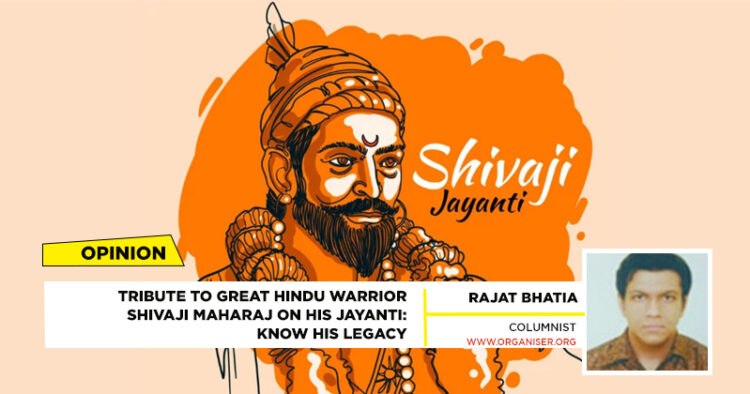India has been seen as the most prosperous and luxurious nation on the world map; due to its splendor and prosperity, India has been the target of foreign invaders. The first foreign invader attacked the land of India was Mohammed bin Qasim in 712. Since then, foreign powers continued to enter India in some way or the other, against which the brave sons of Mother India fought hard, but some despicable Indians somehow managed to support fundamentalists. As a result of which, the entire Indian nation was caught in the chains of slavery.
1565 was a dark period in Indian history when it had been 600 years since the Mahjabi flag had been flying on Indian soil. In North India, the Sunni sect of the Muslim sect ruled under the name of Mughals and in the south, the Shia sect ruled under the name of Shah. According to Islamic ideology, Sunni and Shia are staunch opponents of each other, in present times countries like Iraq and Iran are examples of this. But according to their ideology, when an infidel is mentioned, everyone puts aside their differences and fights together. At that time, the only Indian Vijayanagara Empire was facing these cruel, uncivilized Islamic invaders under the leadership of Rajaram Rai, but after the death of Rajaram Rai, the whole of India was captured by the invaders, after which the Indian society became mentally devoid of self-respect and manliness.
Shivaji Shahji Bhosale, the patron of Hindutva and Hindu nation, was born on February 19, 1630 in the family of Bijapur Sultanate commander Shahji Bhosale and housewife Jijabai. Mother Jijabai started imparting the knowledge of Indian culture and Hindutva to Shivaji right from his childhood and as a result, at the age of just 15, in 1645, Shivaji anointed the Shivalinga with his blood in front of Pandit Shiv Jangam in the Raiveshwar temple on the day of Chaitra Saptami and took oath of Hindavi Empire. From the age of 16, Shivaji started fighting the invaders. In 1650, he gathered various Mavals of Maharashtra and established the Maratha society under which he hoisted the saffron flag on 40 forts.
Seeing Shivaji’s increasing powers in 1659, Nizam Shah declared Afzal Khan the governor of the south with an army of 25,000. By skillfully using diplomacy, Shivaji planned to meet Afzal Khan for a treaty, but that meeting became the last meeting of Afzal Khan. Shivaji paid tribute to his clan goddess Kaal Bhavani and along with this, he came forward as a direct challenge to the Shah Empire in the south.
Shivaji, taking advantage of the religious differences of Muslims and making a treaty with the Mughals of the Sunni sect, brought down the Shah Empire of the Shia sect. In south part of India. In 1670, Nizamshahi had ended in the southern plateau and Maratha rule had emerged and Mughal emperor Aurangzeb was enraged by this, crossed the limits of meanness to stop Shivaji’s bravery and prepared Hindu king Jai Singh against Shivaji. Shivaji, who took oath for the motherland, wrote a letter to Jai Singh – ‘I will hand over to you whatever forts you want. I will also hoist your flag on them, but do not bring fame to Muslims. I can bow down a hundred times before the protectors of Hindu religion, but I will never do anything whose work brings contempt on Hindu religion.’(Subject- Shivaji’s Hindutva movement, Book- Hindutva, Author- Vinayak Savarkar, page 73). Shivaji’s letter shows his highest regard for Indian culture and harmony as a result of which Jai Singh supports Shivaji as much as possible and also offers his sacrifice in the yagya for the Hindu Empire.
On June 6, 1674, Shivaji Maharaj called 50,000 Brahmins at Raigarh Raj Bhavan and formally established the Hindavi Empire as per the wish of ‘ Shri ji’ and declared himself Chhatrapati. As a result of this empire, India became saffronised again and the decline of the Mughal Empire began. According to historians, the events of 1674-75 led to the decline of the Mughal Empire, in which the main ones were Shivaji’s Hindavi Empire in Southern part of India and on the other hand, Sri Guru Teg Bahadur Ji’s self-sacrifice to protect the Kashmiri Pandits(intellectual section of society) in Northern part of India, all these events. Such a momentum of Indianism was created, in which the roots of the Mughal Empire were uprooted from the whole of India and remained confined to a small area.
Shivaji worked throughout his life for cultural and spiritual work by uniting the Hindu society as per the will of Mahadev, as a result of which, even after his death in 1680, the Hindavi Empire (Maratha Empire) continued to spread across the entire Indian nation like a huge tree, thereby giving the Indians the sense of self-respect and manliness again.
In the present times, the society should learn from the life story of Shivaji Shahji Bhosale to work again for the creation of the United Bharat by creating a flow of social harmony and goodwill. The religious systems born in India should give up mutual ideological differences and establish a sense of brotherhood and string the pearls of society like a rosary so that poisonous seeds cannot be sown in the happy and rich tradition of India by any malicious invaders or mean people again.
In the end, I end my article by paying tribute to Shivaji Shah ji Bhosale on the occasion of Hindavi Empire.



















Comments